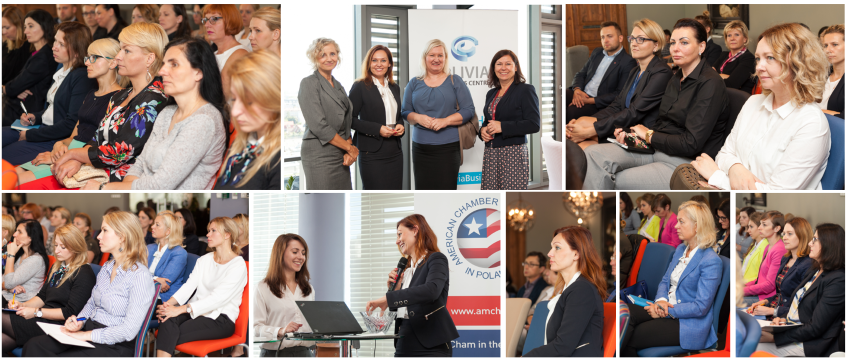Interview with Magdalena Bączyk Manager | Human Capital, Deloitte Advisory Sp. Ltd.
We are living in the world full of continuous changes and development, on an unprecedented scale, of the relation between a human being and new technologies. These latter ones fill nearly every element of our lives. Technological progress has reached unprecedented pace. Artificial intelligence, mobile platforms and social system of cooperation revolutionised our lives, including work. People are good at adopting new technologies, but business does it to a substantially lesser degree.
According to the research carried out by a consulting company Deloitte, organisations all around the world use technology to meet growing expectations of workers, whom they are starting to treat in the same ways as clients. In this respect, Polish HR systems… lag behind.
Although for companies in Poland one of the most important priorities is recruiting the most talented workers, as many as 62% of them admit that they are not prepared for it. New era, very often described as fourth industrial revolution or Big Shift, which is a term coined by us, means radical changes in business, in wider economy and society. In this ground-breaking era, top management staff, both from business and HR departments, feels a huge pressure to create from scratch the rules of organisation, recruitment, development, management and involvement of employees, which are appropriate for the 21stcentury.
During business breakfast organised by American Chamber of Commerce Poland called “2017 HR Trends. Change of the rules in the digital era”, which was held on September 11, 2017 in Olivia Sky Club, the above-mentioned report was presented to Tricity HR community.
We invite you to read an interview with Magdalena Bączyk, an expert in Delloitte, who presented main theses and the results of the report during the above-mentioned event.
Download the report in Polish (PDF, 39,5 MB) 2017 HR Trends
–/–
Monika Bogdanowicz (Olivia Business Centre Communication): The current way of carrying business activity by the most efficient companies in the world is completely different from the one that was valid 10 years ago. However, many companies use the models that were used 100 years ago. They are burdened by outdated practices, systems and behaviours, which are difficult to give up. How does such a situation influence the possibilities of changes and what is essential to make organisations ready to keep up with the pace of technological revolution?
 Magdalena Bączyk, Manager | Human Capital, Deloitte Advisory Sp. Ltd.: There is one main conclusion that can be drawn from his year’s HR Trends research: for the first time, chairmen and HR leaders are unanimous: the way we organised workplaces and understood the meaning of work up to now, has changed. Organisations have started to abandon rigid divisions into sectors and departments – we work in project teams, which consist of people with different competences, who are appointed for the time needed to do a certain task. First of all, teams don’t communicate via e-mails anymore – they use such cooperation platforms as Slack or Basecamp. Not all team members are full-time workers – we have subcontractors, freelancers, crowdsourcing platforms. Finally, we have robots, which take over part of the work, which up to now was performed by people. But these are not teams and robots that make it possible to speak boldly about the revolution in the world of work.
Magdalena Bączyk, Manager | Human Capital, Deloitte Advisory Sp. Ltd.: There is one main conclusion that can be drawn from his year’s HR Trends research: for the first time, chairmen and HR leaders are unanimous: the way we organised workplaces and understood the meaning of work up to now, has changed. Organisations have started to abandon rigid divisions into sectors and departments – we work in project teams, which consist of people with different competences, who are appointed for the time needed to do a certain task. First of all, teams don’t communicate via e-mails anymore – they use such cooperation platforms as Slack or Basecamp. Not all team members are full-time workers – we have subcontractors, freelancers, crowdsourcing platforms. Finally, we have robots, which take over part of the work, which up to now was performed by people. But these are not teams and robots that make it possible to speak boldly about the revolution in the world of work.
The revolution is driven by a seemingly innocent statement, which was explicit in this year’s research: we have to treat workers in the same way as our clients. That is why, we ask employees about their needs in the same way we study clients’ needs. On the basis of obtained information we adjust all processes, ways of work organisation and communication to certain segments of workers in the same way we adjust communication and offers to segments of clients. Treating workers in the same way as clients is a trend, which occupied 4th place in this year’s research in terms of importance. The thing, that is a standard in marketing departments, is slowly being transferred to HR departments.
MB.: What are the main global HR trends, then? How do they relate to conclusions from Polish results of the report?
Magdalena Bączyk: In comparison to global results, in Poland the trend connected with creating organisations of the future, which is a number at international level, turned out to be much less important and occupied 5th place among the priorities of HR leaders. It was outrun by issues connected with employee’s career and education, as well as talent acquisition, which in Poland occupied respectively first and second place. This may indicate that in Poland, to a greater extent than in other countries, we approach human capital management reactively, focusing mainly on current difficulties connected with the shortage of workers with desirable qualifications and competences. Such an attitude can be explained by the fact that in our region significant shortages of talents, which affect nearly all industries and types and levels of positions, are a relatively new phenomenon, if we take into account its scale. However, comparing Polish and global results indicates that apart from the above-mentioned difference, the way our leaders think about the future of HR doesn’t deviate significantly from the views expressed by leaders from different countries.
It is best illustrated by the example of results connected with shaping worker’s experience and the need to change the attitude towards performance management – Polish leaders are carefully looking at these areas and are taking actions. 60% of surveyed organisations in Poland declare that they implemented some elements or a full strategy of building worker’s experience and 61% introduce changes in the systems of performance management, taking into account greater emphasis on enhancing workers’ strengths and coaching. In this respect, the level of advancement of Polish enterprises is the same, or even slightly higher than the level of advancement of companies globally.

MB.: In the context of technological revolution, and most of all in connection with the development of machines’ intelligence and their influence on working environment, it is worth asking about the level of leaders’ awareness in terms of the place and role of… human beings in companies of the future.
Magdalena Bączyk: 31% of this year’s respondents of the survey claimed that they are in the process of implementing the systems of artificial intelligence and robotics and 34% of them are at the phase of pilot programmes in chosen areas. 10% claim that they are fully automated or that they have reached a significant degree of automation. Interestingly, asked about the results of implemented solutions, only 20% of respondents expect a reduction in the number of working places. As many as 77% of respondents are going to transform existing positions in such a way to enable workers to use new technological solutions and focus more on typical human skills, such as problem solving and decision making.
MB.: So, we have optimistic information! People will be the best and irreplaceable in their main roles in business development.
Magdalena Bączyk: Yes, everything indicates that.
–/–
Magdalena Bączyk is a manager in Human Capital Advisory team in Deloitte. She has more than 7 years of experience in consulting in the area of human resources management. She specialises in implementing projects in the area of change management (both technological and organisational), the transformation of HR functions, optimisation of organisational structures, designing and implementing competence models, creating talent development programmes, leadership development programmes and designing systems of management by objectives. She graduated from the faculty of management at the University of Warsaw.
“2017 HR Trends. Change
of the rules in the digital era” report is one of the most extensive research projects carried out by Deloitte, which concerns talents, leadership and challenges facing HR departments in the era of technological revolution.




